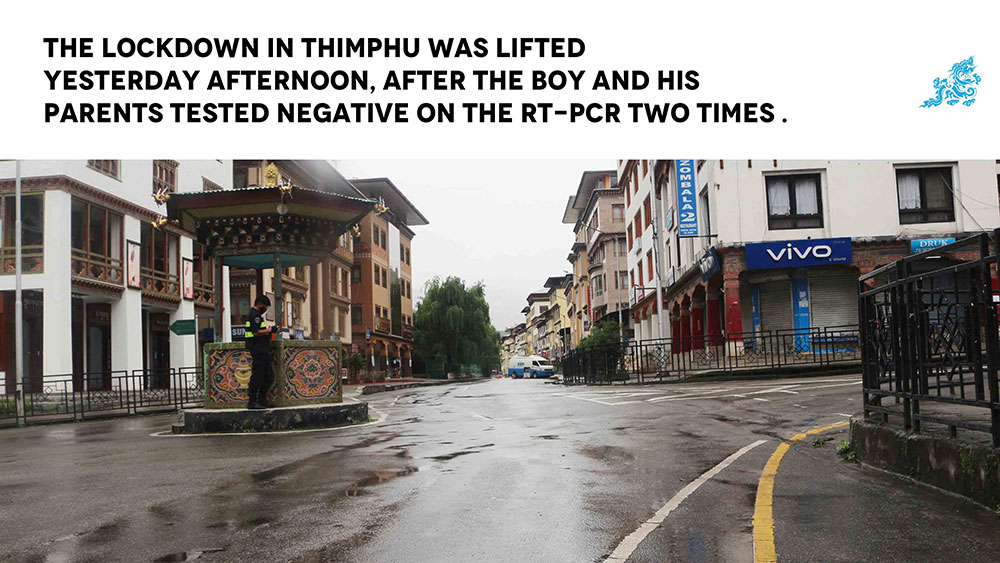Despite an ongoing outbreak of Covid-19 in the country, Thimphu residents were found ill prepared for a lockdown which was always looming large, according to Sowai Lyonpo (health minister) Dechen Wangmo.
The mad-rush observed on June 12 evening, immediately after the announcement of the lockdown, clearly showed the level of residents’ preparedness.
Lyonpo said that the lockdown had to be imposed instantly after an eight-year-old student from Druk School in Thimphu fell sick and tested positive with high viral load on the antigen test. “The fact that the child was sick for three days and it happened to be from a school setting, we had to lockdown the city.”
The three-day lockdown was lifted yesterday afternoon, 45 hours later, after the boy and his parents tested negative two times on the RT-PCR.
Lyonpo said that the lockdowns, despite its inconveniences, were the only effective means of breaking the chain of transmission in the event of an outbreak. “And lockdowns, if we have to impose any, would be sudden without any pre-announcements.”
She said that to begin with, lockdowns would be imposed for a maximum of 72 hours during which the health officials would initiate the case investigation and testing. “Therefore, people should be ready for a lockdown anytime because these 72 hours would be a complete blackout period, meaning there will be no movement at all.”
The minister said that despite the past experience and repeated reminders from the authorities, the residents in Thimphu were unprepared.
The test
After a false alarm set Thimphu residents under another episode of lockdown last weekend, many are now questioning the accuracy of the test. The eight-year-old student had tested positive on the rapid antigen test after suffering from flu-like symptoms.
Clinical microbiologist with the national referral hospital Dr Tshokey said that the rapid antigen test was a good screening test for Covid-19. However, to confirm that a person is infected with the SARS-CoV-2 virus, the samples had to be tested with a RT-PCR, he added.
He said that while health officials have been detecting several antigen positives from the community, the major difference this time was the high cut-off index (COI) found in the student.
Every antigen test analyser machine has a COI set where any reading above 1 on the COI gave positive results. Anything below one, reads negative.
Health officials explained that some of the individuals testing positive on the antigen test had readings of 1.05, 2 and sometimes 3. However, these readings are considered borderline readings and usually they turn negative on the RT-PCR.
Only those with readings above 20 and 30 on the antigen analyser machine have tested positive on the RT-PCR so far. The eight-year-old’s case was similar to this.
Dr Tshokey, however, said that despite the high COI reading, the boy, including his parents, tested negative on the RT-PCR. As per the World Health Organisation’s protocol, the RT-PCR test was repeated after 48 hours. The results were negative once again.
“Although the antigen test is specific for SARS-CoV-2 virus, no test is 100 percent specific. For example, if the test is 98 percent specific, there is this two percent chance of it detecting false positive cases. This is what we just experienced,” he said.
He said that there was also a possibility of other coronavirus triggering a positive result. “There are four know coronaviruses that infect humans and cause similar flu-like symptoms. The child had flu symptoms for a few days and this could be a reason for him testing positive.”
The lockdown, he said, was imposed as a precautionary measure to rule out any possibilities of transmission in the community.
In the meantime, Lyonpo Dechen Wangmo said that although the boy and his primary contacts tested negative during the screening, there was no guarantee that the community was free of the disease. “For now, we are safe based on the testing but we can never say what could happen tomorrow.”
Lyonpo added that despite repeated reminders people, during the screening, said that they had attended gatherings and parties. “We were lucky this time but just imagine if someone had tested positive from the group, it would have been a disaster,” she said.
By Younten Tshedup
Edited by Tshering Palden


